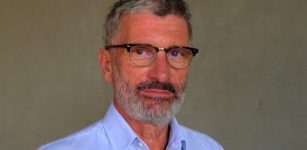A Period of Populist Chaos: An Interview with Professor Jonathan Bogais

Over recent years, China has been constructing a series of artificial islands with military capabilities in the South China Sea. This “great wall of sand” is situated within Beijing’s nine-dash line: a demarcation encompassing the majority of this sea that China asserts sovereignty over.
These islands are constructed upon partly-submerged reefs in the contested Spratly archipelago. In July last year, the Hague ruled in favour of the Philippines, when it found that the Chinese claim of ownership had no legal basis.
A shift in alliances
However, at the time of the landmark decision, the newly-elected Philippine president Rodrigo Duterte signalled that he was going to be more accommodating of China. Instead of asserting his nation’s claim over the islands, he paid a state visit to China, and also commented that he was open to negotiations with Russia.
This marked a shift in the geopolitical alliances in the Asia-Pacific region, as the Philippines have always been the closest ally of the United States in the area.
The rise of a populist
President Duterte has been waging a domestic war on drugs throughout his country. He came to power in June last year, after promising during his campaign to kill citizens who have an involvement with illicit drugs.
The state-sanctioned extrajudicial killings have left the streets of the island nation’s cities awash with blood. As of January this year, the official death toll has risen to more than 7,000.
Duterte is a populist politician who rose to power on a wave of votes from disaffected Filipinos, who’d had enough of the elitist political class that had been running the Philippines for decades.
The populism is spreading
Of course, the outrageous behaviour of the Philippine president during his election campaign may remind you of another figure, who’s since risen to prominence on the international stage.
US president Donald Trump came to power with a suite of extreme election promises that to everyone’s shock he’s actually delivered on.
In his first month in office, Trump pledged to build a Mexican border wall, he approved the completion of the Dakota Access Pipeline and locked transgender children out of the bathrooms matching their gender identity. While this week, he reissued his revised Muslim ban.
And as some experts have said, they believe the Trump administration’s rhetoric on the South China Sea could lead to conflict.
War with China?
Pioneer Australian journalist John Pilger has just released his new documentary The Coming War on China. He posits the theory that the US is provoking a global war with the east Asian nation. He outlines that the superpower has basically surrounded China with a ring of 400 military bases.
Foreign affairs specialist Dr Jean Jonathan Bogais agrees that the US has been the aggressor in its relations with China. He also sees the rise of figures like Trump and Duterte as symptomatic of the new era humanity is moving into.
Sydney Criminal Lawyers® spoke with Dr Jonathan Bogais, adjunct associate professor at the School of Social and Political Sciences at Sydney University, about where this rise in populist politics is taking us.
Firstly, you’ve pointed out that at this juncture in time, there are more people living together in peace within societies, than at any other time in human history. Why’s that so? And what’s the significance of this?
Well, it’s very significant because historically, going back to the Middle Ages, humanity has been at war. And when war has existed the impact on society was absolutely staggering. So people suffered a lot more in those days.
Now war is of a very different nature. If we look at the last century, we have had, of course, some major conflicts – world wars, genocides, a holocaust and so on. But we also can say that we have probably been more at peace during that century, than we have been over the last thousand years.
So there’s been a recent rise in war, but at the same time, there’s also been an increase in people living in peace?
That’s correct.
So let’s look at an area of the world that you’ve focused on: the Philippines. President Rodrigo Duterte has unleashed a war on drugs, which has resulted in the deaths of over 7,000 people.
How has a man like this come to be president? And why aren’t the Filipino people doing more to stop these extrajudicial killings?
Mostly because the Filipino population wants him to do it.
Now, what we must appreciate in the case of the Philippines, is that there are extrajudicial killings organised by the government. But this is the consequence of over 70 years of mismanagement of the population by governments.
During this period, since the independence of the Philippines, we’ve had a succession of powerful families running the country.
The social structure that was developed by those families created an enormous amount of inequality, poverty and a class within the Philippines that prohibited most people from a low socioeconomic background to develop basically.
So the Philippines has been at war internally for the last 70 years.
The drug problem – one thing I must mention, I don’t support the extrajudicial killings – but at the same time, I don’t reject the way Duterte is running the country at the moment. And the reason for that, is that it was inevitable that at some point this type of crisis would happen.
The drug problem in the Philippines, which I have documented now for nearly 20 years, is endemic.
The harm on the population is absolutely staggering. The number of people who die because of drugs has never been reported. The United Nations program on drug eradication has been a failure.
So it was inevitable that someone who suddenly would say, “I will resolve that problem, one way or another,” would get the popular vote.
When Duterte first raised his hand for the presidency, most people never believed that he would succeed. I did, because of that problem.
What we need to look at now, is not so much, how do we stop those killings, because that’s not going to end. But what strategy can we put in place to help the government develop new policies?
So rather than go against Duterte, we actually have to take into consideration that he is a voice of millions of people who have suffered from this crisis.
China’s constructing artificial islands in the South China Sea. Last year, the Hague ruled that China had no legal claim of sovereignty over the region. However, Duterte chose not to enforce this.
What’s the significance of Duterte’s decision not to enforce it? And how does this change the region’s geopolitics?
Duterte made it very clear that he wouldn’t support a confrontation in the South China Sea. He made it very clear before the election.
Should we have had the previous administration of Benigno Aquino leading the Philippines at the time of the Hague ruling, there’s no doubt Aquino would have wanted it to be enforced, because of the alliance with the United States.
Then the US would have been involved in what would no doubt have been a confrontation. I’m not saying a war. But definitely a confrontation and a standoff.
Duterte didn’t want that, because ultimately he was elected on domestic issues, not international issues. Duterte had two objectives to fulfil: one, the drug economy, and two, improving the economy within the Philippines, so that it could address poverty and inequality.
Strategically, I think a conflict just outside the Philippines wouldn’t serve any purpose for him. But by defusing this crisis, by not enforcing the Hague ruling, he first created a status quo, meaning nearly a year later, we don’t have a conflict there anymore.
But most importantly, he had the tools to negotiate with China. And China then could send foreign investment and aid, which is starting to happen now.
So I guess it was just a very strategic decision from the start to tell the United States, “We’ve given you access to our land for many years – to your military and so on. But in return you have done very little to improve the lives of the poor people.”
In fact, the United States have always been aligned with the families that ran the Philippines and that’s the way Duterte sees it.
So for him, putting the US in a position where they weren’t the hegemon anymore – they weren’t making the decision on the deal for the Filipino people, because that’s what happened before – was a way also to tell China, “Well, we’re open for business.” And Russia as well.
Now you place, as many others do, great significance in the rising power of China. The country has re-emerged as a global economic force and a regional military power. And Beijing’s been expanding its sphere of influence into other areas, like the South China Sea and Africa.
Just where do you see the emerging China heading as a global power? And are they looking to flex their military muscles?
Well first I don’t see China as a militarily aggressive state. I mean, if we look at it historically, it’s very rarely happened. If I look at hundreds of years ago, when China was leading the world economy, there was very little conflict then.
So China is a growing economic power. Historically, we’ve seen the British Empire and the United States: every time a country rises to a level of strong economic power, expansionism, so does the military. So this goes hand in hand.
There’s absolutely no surprise that China would want to protect itself and therefore, rebuild its military, especially the navy, which is very much insignificant at this stage. The Chinese military may comprise of millions of people, but that’s completely irrelevant because it’s ill-equipped.
And with regard to the Chinese Navy, it’s maybe 5 percent of that of the United States. So once again, that’s not surprising.
The South China Sea, I think, is also a reaction to the declaration made by Hillary Clinton – the pivot to Southeast Asia that was later called the “rebalance.” If you look at the timeline, there’s always been a form of interaction by China in the South China Sea. Their claim was there a long time ago.
But the development of the islands is part of a reaction to what China sees as a containment by the United States. And that’s a very delicate issue, because some will say, “China is expanding,” and others, like me, will say, “China is actually reacting and in that process, expanding.”
There is a conflict in the Asia-Pacific region between the United States – that wants to remain the hegemon and have done it historically always through military means – and China, which feels through its economic expansion, it might actually face a confrontation with the US should the deficit turn much more in favour of China.
It’s a very complex situation there, and there’s no clear answer.
John Pilger’s just released his new documentary. His theory is that the US is provoking China into a global war, and the superpower has surrounded the nation with a ring of military bases.
He says that the media is portraying China as the aggressor, but actually the US is. And he also believes that a nuclear war is possible.
What’s your take on Pilger’s theory?
I haven’t seen the documentary, but I know of John’s work. I think he’s right.
If we look at it strategically, what the US and its allies have done is to create a zone – a number of zones of influence centred in the Pacific Ocean, around Guam, in the Indian Ocean, in Australia with Darwin, Singapore, Vietnam, and so on – which would allow the US to literally blockade China very quickly if it felt it had to.
So in that respect, Pilger is absolutely right. This exists, it’s well-documented. I’ve written about it also, a few times.
The risk, of course, would be, how could a confrontation develop? China doesn’t want to go to war.
China is satisfied with its economic expansion. But the problem will be the US, especially if we have a US administration that’s extremely responsive and reacting to an economic downturn. That’s where the risk will be.
I don’t believe that in the near future we’re going to face any nuclear confrontation. But it’s not impossible, that we will face an attempt by the US to impress upon China, and demonstrate to China, that it has the muscle to control the region.
If you go back to what happened four years ago, when Typhoon Haiyan devastated the Philippines. There was a great example there of a military-led humanitarian intervention. The US demonstrated that within a week they could have a massive navy and combat force presence in the Philippines.
At the time, it was a humanitarian intervention, but that could also become, should it be needed, an intervention to repossess an island for example. So it was a show of strength from the United States against China.
Pilger is right with that. And his great concern, I have the same concern, I won’t go and talk on this point of nuclear confrontation, but it’s not impossible.
Right now, you believe we’re moving into a new age that you refer to as the Synthetical Age. What characterises this? And what makes it significant compared to other ages?
We just ended what was called the Information Age. It was based on technology and IT communication. There was one element missing, and that was the “social.”
So what we experienced in that period was great technological and communication developments. But never, during this period, did we consider the impact of those changes on society.
That’s why, we have some of the levels of inequality. And also, a very small percentage of the population being extremely wealthy, and a very large percentage of it being extremely poor.
Now we’re moving into an age which is very different, because we’ve realised the consequences of the mismanagement of that information age socially. We’re now starting to look at ethics, which is a great part of my work.
We’re looking at quantum technology. No doubt within a few years a quantum computer will be developed, and that’s going to revolutionise technology and IT.
The difference is that the experienced people in this area realised that without looking at the consequences of new technology on society, we would probably have a catastrophe.
So now we have an age which includes the technology, the IT and the social, as in ethics.
And that’s based on a new thing, the consequences on society of that new technology. And we have now the very first example of programs – I’m involved in one of them – where we have on the one hand, physicists and system design engineers and on the other hand, social scientists. This has never happened before.
It actually works in making sure that the technologists understand that what they do will impact society. And that’s the differences between the two.
You theorise that Duterte’s presidency, along with Donald Trump’s election victory and the outcome of the Brexit vote, are all representative of the changes humanity is going through as we move into this new age.
How are they symptomatic of this new age?
Well the reason why we have this populism, is because we have what we call the elite classes: this expert class that’s made up of politicians, lawyers – who are working directly with the implementing of the policies and changes in constitutions – and academics.
We have the top layer of experts in our society that’s become completely disconnected with the needs of the people. And that disconnection is part of the cause of populism. Because many people now don’t believe in political systems. They don’t believe in the way that politicians are running politics.
That’s why we have populism. People like Trump and Duterte have understood that. And ultimately, had very little to do with it. All they had to do was to listen to the voices of dissatisfaction of the people. And these voices helped those leaders with becoming the presidents and that was inevitable.
In fact, if we had had another president in the US, that situation would have happened later, because this was inevitable. It’s the same in the Philippines.
So we’re seeing this move towards the far-right in the Philippines and the US. Do you foresee this becoming more extreme?
I think it will be more extreme. And I think it will start with Europe. With Brexit, it’s very clear that we’re going to face a semi-disintegration of the European Community.
We have elections coming in France, Germany and Holland. And it’s very clear that the nationalist movements are getting stronger.
A lot of this has to do with security, immigration and so on.
But nationalism has always existed in Europe, that’s not new. The European Community was first set up to address issues of nationalism, to try to prevent a repeat of what we had in between the two world wars that led to the second world war.
What we have now is a return to the way things were. And it’s all happening very quickly. So I think it will get worse before it gets better.
Do you see this global move to the right leading to more conflicts?
It will lead to domestic conflict most definitely. Instability. I don’t see any war happening in the near future. But we’ll certainly see a lot more discrimination. And where the conflicts could occur, it’s not really in Europe for example.
Due to the high percentage of people who are currently stateless, and we have millions of them, what we need to appreciate is, what do we need to do with that? It’s one thing to say, “You cannot come in our country.” But those people still exist. They’re still alive.
They cannot live in camps forever. And that’s our biggest problem: what do we do with them? So an enormous force of millions of people don’t turn against us. And I think we must be well aware of that.
And lastly, as we move into the Synthetical Age. Is it all going to be dark times, or are there going to be some positive outcomes up ahead?
I think so. We’re in a period of change. Populism won’t last. It just can’t last. So I think we need to experience chaos. We work in complex systems. Chaos is not necessarily a bad thing. Chaos will lead to transformation. We cannot have transformation without chaos.
So for example, we couldn’t have transformation if we had Clinton in the US, Aquino in the Philippines, and so on. We would never transform. We’d just have the status quo.
Whereas, now, what we have is a period of chaos, and we may have actually quite a rough ride. But from that we shall get transformation. It’s evitable. But how painful the chaos is, that remains to be seen.
But there’s no choice. We have to go through it.
Dr Bogais, thank you very much for sharing your ideas with us today. And best of luck with your coming presentations and work at the German Southeast Asian Centre of Excellence for Public Policy and Good Governance in Bangkok this month.
Thank you







